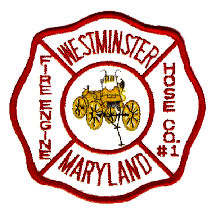New life saving equipment put into service at the
Westminster Volunteer Fire Department.
Wednesday, February 17, 2016
By the Westminster Fire Engine and Hose Company No. 1
Westminster Volunteer Fire Department, Westminster Md. - - Thanks
to a generous BGE Public Safety Grant, money donated by the local community,
and the continuing support from the city of Westminster the Westminster Fire
Engine and Hose Co. No. 1 recently put into service medical technology that
could help reduce mortality rates for patients experiencing cardiac arrest.
Along with personal injuries due to falls, motor vehicle
accidents, and drug overdoses, the Westminster Volunteer Fire Department
continues to see an uptick in the number of calls for cardiac arrests.
Last year, in 2015, the department ran 5,743 EMS. That’s an
increase of over a thousand calls a years from five years ago in 2010 when the
department ran 4,731 calls. Add to that the 1,917 fire calls in 2015, and
Westminster remains one of the busiest fire stations in the state.
To respond to that many calls a year requires lots of
staffing and the latest technology available to stretch limited resources.
According to Westminster Fire Department PIO Kevin Dayhoff, in January the
department was able to purchase a cutting edge LUCAS Chest Compression System for
treatment of the out of hospital acute cardiac arrest. Of the $14,000 price tag
for the equipment, $5,000.00 was donated to the company by a BGE grant.
Valencia A. McClure, the director of communications for BGE
noted, “At BGE, the safety of our customers and employees is paramount. We
greatly value our partnership with emergency response and safety organizations
who share our mission… We appreciate everything that our emergency responder
partners do to help keep our customers safe in Carroll County and beyond.”
“Despite improvements in medical therapy and other devices
modifying ventilatory support, cardiopulmonary support based especially on
closed chest compression is pivotal to maximize survival chances. However,
manual chest compression is energy consuming and operator-intensive.
“Moreover, it cannot be performed successfully for a
prolonged period of time by any individual healthcare provider nor in logistically
challenging settings… Manual chest compression appears particularly challenging
for patients in cardiac arrest who also require an emergent invasive procedure,
such as primary percutaneous coronary intervention (PCI)… The LUCAS mechanical
chest compression device provides external and automated closed chest
compression, thus enabling even complex invasive procedures without
interrupting cardiopulmonary support.”
In other words, many cardiac arrests occur in and around the
home and farm, in places where it is difficult and time-consuming to respond. Manually
performing CPR chest compressions for long periods of time during a long
ambulance ride to the hospital can be physically difficult and sometimes not
possible. This is where the LUCAS device comes into play.
According to Westminster Volunteer Fire Department Chief Jim
Starry, “LUCAS is an easy to use and lightweight device that provides quality
chest compressions according to the American Heart Association guidelines for
CPR.”
During a recent training exercise on the LUCAS device,
Westminster EMS provider Josh Evans said, “LUCAS allows paramedics and firefighters
to better facilitate the delivery of vital oxygen to the brain and priming the
heart for a defibrillation shock in cardiac arrest situations.”
“Traditionally, chest compressions (CPR) was done manually
by first responders at a rate of 100 compressions per minute,” According to
Lieutenant Brett Pearce at the Westminster Fire Engine and Hose Co. No. 1. “Fatigue,
poor positioning, and inadequate depth of the compression were all problems
that needed to be overcome…”
“With the LUCAS, several scientific research studies have
shown that patients who have a heart attack and need CPR have better outcomes
when LUCAS is used,” according to Westminster EMS Captain Laura Tyler. “The
rate, and depth that LUCAS offers means that patients have a better chance of
surviving out of hospital cardiac arrest when used in conjunction with early
defibrillation of the heart.”
“LUCAS also improves safety for EMS providers,” said
Westminster assistant chief Jason Tyler. “The most dangerous time for EMT's and
Paramedics is during the transport to the hospital. The need to provide
lifesaving skills for the patient often means that personnel must work in
difficult and dangerous positions without the use of seat belts. LUCAS allows
for all to be properly seated and belted while in the back of a moving
ambulance.”
“LUCAS offers emergency medical providers to deliver better
care, personal safety during transport, and better lifesaving techniques to the
citizens and visitors to Westminster,” said Westminster Volunteer Fire
Department President Jim Bangerd.
Westminster Common Council member Tony Chiavacci, who sits
on the council public safety committee said, “This is a great example of the
Westminster and Carroll community coming together to fill a need…”
“The fire company would like to thank BGE, Westminster city government,
and all the citizens who donated money to make this equipment possible. You
never know, the life it may save might be a family member, a neighbor, or a
coworker,” said Bangerd.
----- The men and women of the Westminster Fire Engine and
Hose Company No. 1 ----

































